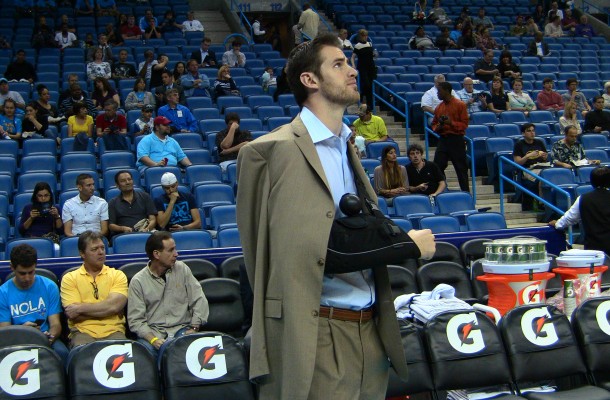Team Progress this Season – and Bad Wings

In part 2 of the season Moratorium, I take a look at the changes from last year.
Glass Half Full
The Hornets are a better offensive team this year. A lot better, actually. After posting the 28th ranked offense last year, the Hornets have improved their shooting to above the league average, jumped into the top 10 at offensive rebound rate, and managed to cut their turnover rate from 29th to 20th. That has resulted in the 14th ranked offense in the league this year. A significant improvement.
The reasons aren’t hard to pick out. Last year only Gustavo Ayon played more than 1000 minutes for the Hornets and managed an eFG% over 50%. This season, the Hornets have four such players: Ryan Anderson, Anthony Davis, Robin Lopez, and Roger Mason. Last year, the Hornets had zero players play 1000 minutes (Okafor only hit 781) and post an offensive rebound rate of 10% or better. This year, both Anthony Davis and Robin Lopez did it. Almost every position saw an improvement to its turnover rate except small forward, where Aminu got more minutes, and therefore had more time to turn the ball over.
Once again, the offensive weakness for the Hornets came on the wing, where Austin Rivers, Aminu, and Eric Gordon combined to produce well below average true shooting and effective field goal numbers.(And before anyone blames Rivers, none of these three players had an above average eFG%, though Gordon did post a slightly above average TS% due to his free throws.) In fact, if not for Roger Mason and a few minutes from Darius Miller, the Hornets wing position is a major black hole, negating the scoring efficiency of the Hornets frontcourt and relegating this team to an average offense.
If Dell and Monty are looking for a high-efficiency offense, they should simply add a single efficient scorer/shooter on the wing this off-season. Even if Eric Gordon doesn’t bounce back, that should push the Hornets near the top 10 in offense.
Glass Half Empty
Of course, it should be pretty obvious that something else has changed with this team – something that needs to counteract the offensive improvements – or this team would be on the playoff bubble. The culprit is a decline from the 15th ranked defense in the league to the 28th ranked defense, as the Hornets have allowed fully 4.5 more points per 100 possessions than they did last year.
Defense is always harder to quantify individually than offense, but overall the team has some serious red flags. The team is allowing opponents to average an eFG% of 51.7%. As mentioned above, only three Hornets who played significant minutes shot better than that this year. It’s a horrendeous number and easily counteracts the solid improvement in the Hornets defensive rebounding this season. Pile on top of that the fact the Hornets remain in the bottom 10 at giving away free throws and in forcing turnovers, and you see the anatomy of a slow, bad defense.
So what does Dell need to do to stiffen the defense? Quite simply, he needs to start chipping away at those players who are defensive liabilities. This season, the baseline defensive number is 109 – the number of points the team allowed per possession. It’s a bad number, but even that can be used to look at the major contributors on the team, and determine which players were on the floor when that number got worse – and which players were on the floor when it got better.
Defense Boosters:
- Anthony Davis – Rating 104
- Al Farouq Aminu – Rating 104
- Jason Smith – Rating 108
Defense Wreckers:
- Austin Rivers – Rating 114
- Brian Roberts – Rating 113
- Eric Gordon – Rating 113
- Grievis Vasquez – Rating 112
- Ryan Anderson – Rating 111
(The rest of the major players had no real positive or negative impact on the defensive baseline. That does not, does NOT mean they are good defenders, just that this year they aren’t the main problem or a possible solution.)
Now, by no means should we take these numbers in a vacuum. Rivers was awful for half the season, and got a lot better by the end. Still, it points to one dramatic but unsurprising bit of news: Eric Gordon was rock awful this season. While he played, the team scored 101 points per 100 possessions as he contributed to the negative production on the wing. Defensively, the team allowed 113 points per possession. That 12-point differential is the largest on the team owned by anyone not named Austin Rivers. The shooting guard position, on which the Hornets spent 15 million dollars and the 10th pick in the draft this last summer, is a gaping, oozing sore.
If Dell wants to improve this squad defensively, at least two defensively capable wing/guards should be brought in – and considering that none of the players on the list that helped wreck the defense were better than average offensively except Ryan Anderson, this alone should not impact the offense as much as it improves the defense.





13 Comments